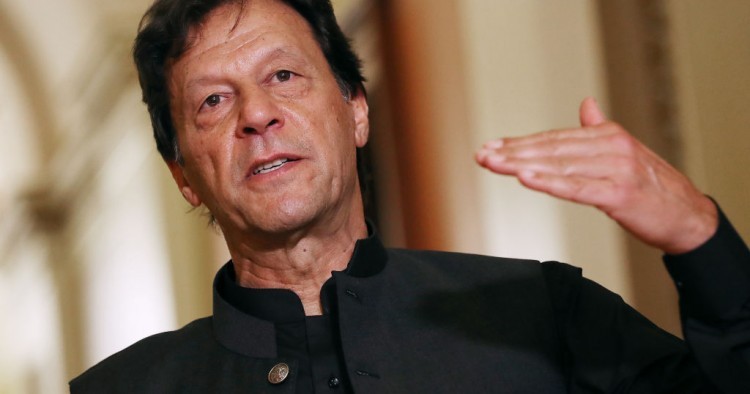During Imran Khan’s long quest for the premiership in Pakistan, he rarely disguised his disdain for the United States. Khan’s stump speech repeatedly criticized Pakistan for fighting at great cost an American war on terrorism. It played well in a country where only one in five Pakistanis holds a favorable view of the U.S. Khan’s visible insurgent sympathies had once earned him the nickname of “Taliban Khan.” Most observers assumed, however, that once in office he would discard the rhetoric — and they were right. As prime minister he could ill afford to alienate the U.S with its global economic leverage and political clout. He owed it to his military benefactors to mind his words.
Khan’s months of restraint ended last week in an address to the National Assembly. In the course of criticizing his predecessors for having sided with the U.S. and boasting that “no one insults us now,” he went on to praise Osama bin Laden. Khan’s remark that bin Laden had been martyred by the U.S. — that he was a shahid, a powerful term in Islamic parlance — was certain to raise hackles in the U.S. and create discomfort in Pakistan. Along with the party opposition, Pakistan’s social media and news networks have been anything but sympathetic to Khan's use of shahid.The prime minister’s rhetoric also seemed ill advised at a delicate time when Pakistan is working with the U.S. to promote intra-Afghan peace talks. Furthermore, Islamabad is presently trying to demonstrate to the multinational Financial Action Task Force the sincerity of its claim to be cracking down on terrorist financing. If it fails to do so, Pakistan could be placed on a blacklist that would greatly damage the country’s financial system in an economy already on life support.
Why Khan went off script is difficult to say. In a sense he has never ceased campaigning. There is no question that the prime minister is far more comfortable as an outsider, standing in opposition, than he is at managing the reins of government. After having succeeded in his goal of placing most of his major political adversaries in the dock, he takes little interest in the details of governing — this despite having laid out an ambitious social reform program. On the pressing issues around the economy and dealing with the coronavirus health crisis, he has stumbled. With his recent comments to the Parliament Khan has succeeded in shooting himself and Pakistan in the foot.
Marvin G. Weinbaum is MEI's Director for Afghanistan and Pakistan Studies. This article was co-authored by Sawera Khan, Jack Stewart, and Hamid Safi, research assistants to Marvin G. Weinbaum.
Photo by Chip Somodevilla/Getty Images
The Middle East Institute (MEI) is an independent, non-partisan, non-for-profit, educational organization. It does not engage in advocacy and its scholars’ opinions are their own. MEI welcomes financial donations, but retains sole editorial control over its work and its publications reflect only the authors’ views. For a listing of MEI donors, please click here.













